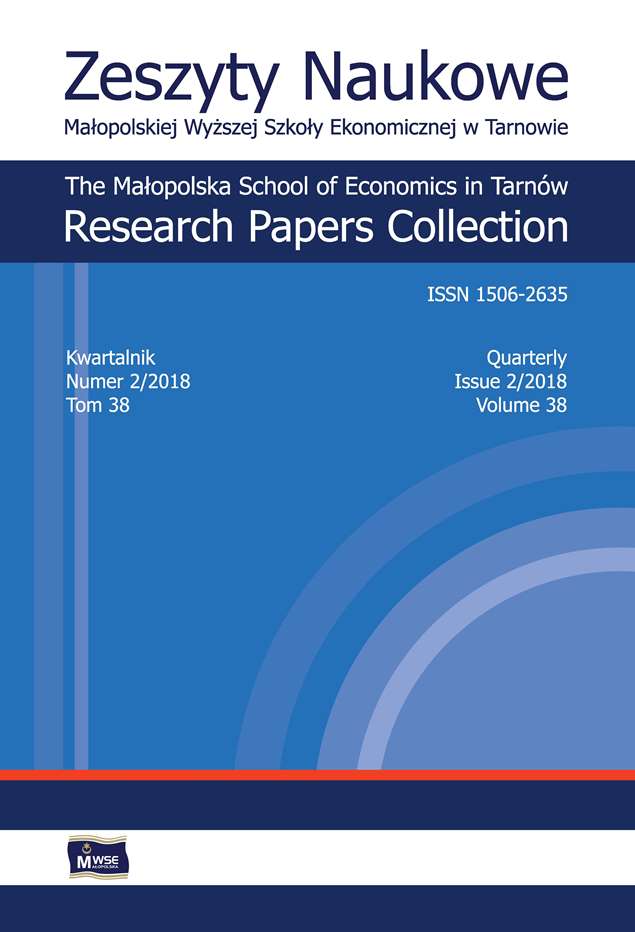Abstract
The purpose of the article was to analyse and assess the dynamic financial liquidity of the companies based on a cash flow statement. The study covered the steel companies listed on the Warsaw Stock Exchange, with their analysis covering the years 2014–2016. In the article, the main research hypothesis is whether the cash flow statement has been a useful report for assessing the financial liquidity of an enterprise and the auxiliary hypothesis is whether it is possible to assess the ability to generate, obtain and use cash in an enterprise on the basis of the cash flow statement. The paper presents the essence and structure of the cash flow statement, shows the cognitive value of information derived from the cash flow statement, and characterizes the tools for measurement of financial liquidity on the basis of the cash flow statement. The main part of the thesis involves the measuring and evaluation of the company’s financial liquidity on the example of companies from the steel industry sector listed on the Warsaw Stock Exchange. The paper uses the research method of analysing the literature in the field of financial analysis and financial reporting, the method of analysing the financial data included in the cash flow statements of steel companies listed on the Warsaw Stock Exchange.
References
Gabrusewicz, W. (2014). Analiza finansowa przedsiębiorstwa. Teoria i zastosowanie. Warszawa: PWE. ISBN 9788320820867.
View in Google Scholar
Gos, W. (2001). Przepływy pieniężne w systemie rachunkowości. Szczecin: Wydawnictwo Uniwersytetu Szczecińskiego. ISBN 8372411999.
View in Google Scholar
Gos, W. (2004). Rachunek przepływów pieniężnych w świetle krajowego standardu rachunkowości. Warszawa: Difin. ISBN 8372514089.
View in Google Scholar
International Accounting Standard No. 7. (1992). Cash Flow Statements. International Accounting Standards Committee.
View in Google Scholar
Kawczyńska, M., Cieślik, K. (2012). Znaczenie przepływów pieniężnych w zarządzaniu jednostką gospodarczą. Zeszyty Naukowe Uniwersytetu Szczecińskiego. Studia i Prace Wydziału Nauk Ekonomicznych i Zarządzania, 749(30), 23–33.
View in Google Scholar
Kosińska, J., Cicirko, T., Gołębiowski, G. (2010). Badanie płynności finansowej. W: T. Cicirko (red.). Podstawy zarządzania płynnością finansową przedsiębiorstwa (s. 81–109). Warszawa: Oficyna Wydawnicza Szkoła Główna Handlowa w Warszawie. ISBN 9788373785335.
View in Google Scholar
Kuciński, A. (2016). Płynność finansowa przedsiębiorstw notowanych na rynku NewConnect. W: Z. Głodek, A. Kuciński (red.). Wybrane aspekty z finansów i rynków finansowych (s. 109–121). Gorzów Wielkopolski: Akademia im. Jakuba z Paradyża w Gorzowie Wielkopolskim. ISBN 9788365466136.
View in Google Scholar
Orliński, B. (2013). Czynniki kształtujące przepływy pieniężne z działalności operacyjnej. Studia Oeconomica Posnaniensia, 1(12), 73–86.
View in Google Scholar
Sierpińska, M., Wędzki, D. (2001). Zarządzanie płynnością finansową w przedsiębiorstwie. Warszawa: Wydawnictwo Naukowe PWN. ISBN 8301121939.
View in Google Scholar
Śnieżek, E. (1997). Jak czytać cash flow. Warszawa: Fundacja Rozwoju Rachunkowości w Polsce. ISBN 8386543728.
View in Google Scholar
Śnieżek, E., Wiatr, M. (2011a). Interpretacja i analiza przepływów pieniężnych – ujęcie sprawozdawcze i menedżerskie. Warszawa: Wolters Kluwer. ISBN 9788326416354.
View in Google Scholar
Śnieżek, E., Wiatr, M. (2011b). Raportowanie przepływów pieniężnych w kontekście zmian we współczesnej sprawozdawczości finansowej. Warszawa: Wolters Kluwer. ISBN 9788326411366.
View in Google Scholar
Śnieżek, E., Wiatr, M. (2015). Przepływy pieniężne. Warszawa: Wolters Kluwer. ISBN 9788326493133.
View in Google Scholar
Turyna, J. (2008). MSR 7 Rachunek przepływów pieniężnych. Warszawa: Difin. ISBN 9788372518354.
View in Google Scholar
Wajszczuk, K. (red.). (2013). Rachunek przepływów pieniężnych w teorii i praktyce. Program komputerowy: Cash Flow System. Warszawa: Difin. ISBN 9788376419015.
View in Google Scholar
Walińska, E. (1997). Przepływy pieniężne w ujęciu ex ante. Acta Universitatis Lodziensis. Folia Oeconomica, 145, 135–149.
View in Google Scholar
Walińska, E. (2016). Meritum Rachunkowość. Rachunkowość i sprawozdawczość finansowa. Warszawa: Wolters Kluwer. ISBN 9788326489433.
View in Google Scholar
Wędzki, D. (2003). Strategie płynności finansowej przedsiębiorstwa – przepływy pieniężne a wartość dla właścicieli. Kraków: Oficyna Ekon
View in Google Scholar
© Copyright by Małopolska School of Economics in Tarnów. The articles are available under the Creative Commons Attribution NonCommercial-NoDerivatives 4.0 International License


